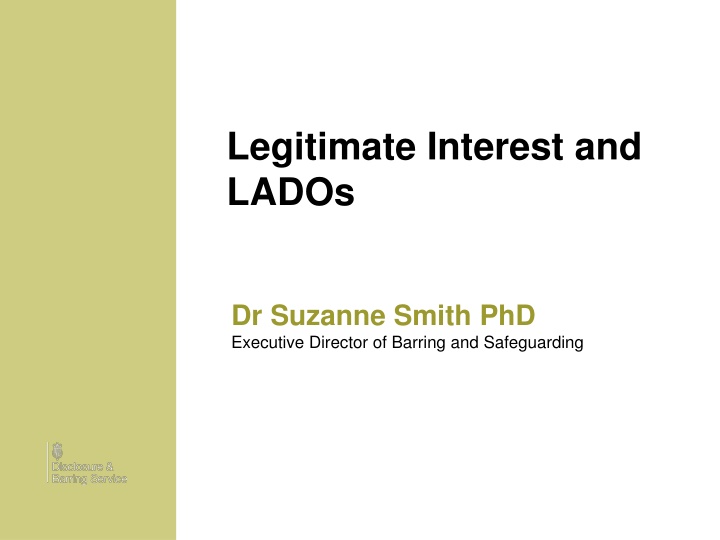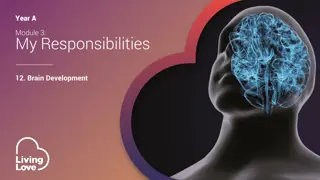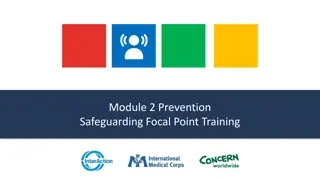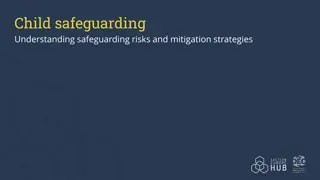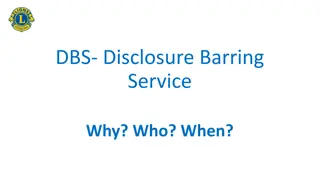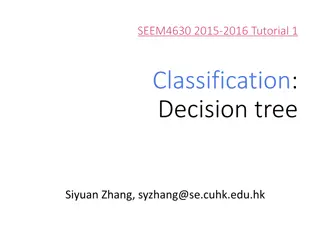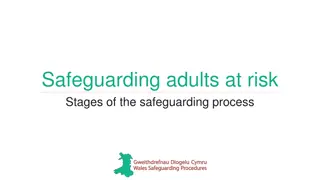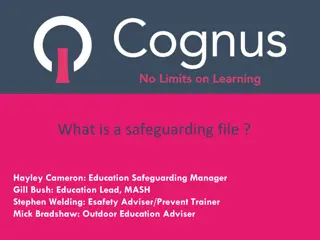Safeguarding Measures: Understanding Barring and Decision Making Process
Learn about legitimate interest and Local Authority Designated Officers (LADOs) in safeguarding, including the thresholds for making a referral and defining relevant conduct and harm. Explore the typical barring decision-making process, emphasizing the importance of balancing probabilities, reviews, appeals, and the stages involved.
Download Presentation

Please find below an Image/Link to download the presentation.
The content on the website is provided AS IS for your information and personal use only. It may not be sold, licensed, or shared on other websites without obtaining consent from the author.If you encounter any issues during the download, it is possible that the publisher has removed the file from their server.
You are allowed to download the files provided on this website for personal or commercial use, subject to the condition that they are used lawfully. All files are the property of their respective owners.
The content on the website is provided AS IS for your information and personal use only. It may not be sold, licensed, or shared on other websites without obtaining consent from the author.
E N D
Presentation Transcript
Legitimate Interest and LADOs Dr Suzanne Smith PhD Executive Director of Barring and Safeguarding
Barring thresholds when to make a referral Stage 1: The organisation withdraws permission for an individual to engage in regulated activity with children and/or vulnerable adults; or the organisation moves the individual to another area of work that isn t regulated activity. To find out more information about what regulated activity is please see ______. Stage 2: The organisation thinks the individual has carried out one of the following: engaged in relevant conduct in relation to children and/or adults. An action or inaction has harmed a child or vulnerable adult or put them at risk or harm or; satisfied the harm test in relation to children and / or vulnerable adults. e.g. there has been no relevant conduct but a risk of harm to a child or vulnerable still exists; or been cautioned or convicted of a relevant offence. Making Recruitment Safer March 2021 April 2021
What is relevant conduct Conduct which : endangers a child or adult or is likely to endanger a child or adult if repeated against or in relation to a child or adult would endanger the child or adult or be likely to endanger the child or adult involves sexual material relating to children (including possession of such material) involves sexually explicit images depicting violence against human beings (including possession of such images) is of a sexual nature involving a child or adult Making Recruitment Safer 3
What is Harm A person s conduct endangers a child or adult if they: harm a child or adult cause a child or adult to be harmed put a child or adult at risk of harm attempt to harm a child or adult incite another to harm a child or adult Making Recruitment Safer 4
Typical Barring Decision Making Process Balance of Probability . Reviews After minimum barring period or at any time if statutory conditions met Appeals On the grounds of error of fact or an error of law Stage 5 Barring Decision Relevant offences (Autobar) without representations Case can be closed at any stage Stage 4 Representations from the referred person Relevant offences (Autobar) with representations Stage 3 Structured Judgement Process Stage 2 Information Gathering and Assessment The Barring Decision Making Process may vary according to the nature of the referral Stage 1 Initial case assessment Relevant offences Referral Route Making Recruitment Safer 5
Legitimate Interest Under the Safeguarding Vulnerable Groups (Miscellaneous Amendments) Order 2012, the DBS may at the request of person with a legitimate interest in knowing if an individual is barred, inform that person if the individual is included in the DBS barred lists. DBS defines legitimate interest as the sharing of barred list information where the sharing is in line with our purpose to safeguard the public by preventing barred people from working with relevant groups. Making Recruitment Safer March 2021 April 2021
Legitimate Interest Principles A legitimate interest into whether a person is included on either or both of the DBS barred lists exists if the requester is in a position to, and intends to, use the information to take appropriate action in relation to the protection of children or adults in receipt of a regulated activity. Legitimate interest cannot be used purely for information gathering purposes. Legitimate Interest requests should normally only be made when there is no other legislative provision or gateway which enables barring information to be shared. Exceptions should be detailed in relevant Data Sharing Agreements, for example applications made in order to comply with the School Staffing (England) Regulations 2009. Making Recruitment Safer 7
Making Recruitment Safer March 2021
